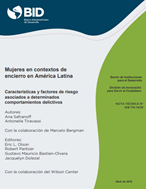Incarcerated Women in Latin America: Characteristics and Risk Factors Associated with Criminal Behavior
Date
Apr 2018
EDITOR
Olson, Eric L.; Pantzer, Robert; Bastien-Olvera, Gustavo Mauricio; Dolezal, Jacquelyn
Based on an analysis of the Survey of Convicted Prisoners relating to eight Latin American countries, this document contributes to a deepening of the knowledge about women who have been imprisoned. First, the results of this indepth study highlight the gender differences in terms of criminal behavior, as well as the level to which social exclusion is prevalent prior to imprisonment. Women tend to commit less violent and aggressive crimes, have a shorter criminal history, and are more likely to commit a crime while accompanied by a male figure on whom they are dependent. Similarly, women are found to have been far more vulnerable compared to men prior to entering prison. The proportion of women who are unemployed is not only higher than that of men, but childcare responsibilities typically fall upon the woman. Second, this report applies multivariate regression models to identify the risk factors associated with the criminal trajectory of imprisoned women; these indicate where intervention is required in order to prevent female delinquency. The report also emphasizes the fact that a girl’s social interactions (primarily her peer group) can influence her criminal behavior, as do particular sociodemographic characteristics such as having children. Furthermore, the document suggests that such factors must be taken into account in terms of preventive measures as well as the uniqueness of incarcerated women when designing policies that relate to detention and social reintegration.




